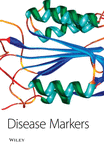High Expression of Cathepsin D in Non-Hodgkin’s Lymphomas Negatively Impacts on Clinical Outcome
Abstract
The lysosomal protease Cathepsin D (CD) has been implicated in the homeostasis of lymphatic tissues. We investigated whether the level of CD expression influences the progression and the clinical outcome in Non-Hodgkin’s Lymphomas (NHLs). The expression of CD was assessed by immunohistochemistry and immunofluorescence in biopsies of Diffuse Large B Cell Lymphomas (DLBCL, 35 cases), Follicular Lymphomas (FL, 9 cases of grade I-II plus 14 cases of grade IIIB), Chronic Lymphocytic Leukaemias (CLL, 17 cases) and Peripheral T-cell Lymphomas (PTCL, 5 cases). CD staining showed a cytoplasmic punctate pattern compatible with its lysosomal localization. Based on the level of CD expression and the proportion of positive cells, lymphomas were classified as ‘low expressing’ (< 20% of tumor cells) or ‘highly expressing’ (≥ 20% of tumor cells). Lymphomas highly expressing CD were associated with a worse stage (III-IV) at diagnosis (31/34 cases; p = 0.002) and with a poor clinical outcome (i.e., partial remission and death; 28/34 cases; p = 0.03). In the subgroup of aggressive/high grade of malignancy lymphomas (i.e., DLBCL, FL IIIB and PTCL), the Kaplan-Meier curve revealed a very low cumulative overall survival probability (~20% at 5 year) for patients bearing a NHL with > 40% CD-positive cells compared to that of patients bearing a NHL with < 20% CD-positive cells (~70% at 5 year). This correlation was statistically significant (log-rank test, p = 0.01). In Cox multivariate analysis CD failed to be a prognosticator independent of pathologic stage, though the hazard ratio confirmed the association of low expression with a better survival probability. These data indicate that the presence of a high percentage of CD-positive tumor cells negatively reflects on the progression of NHLs.




